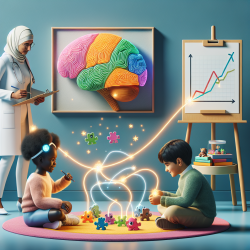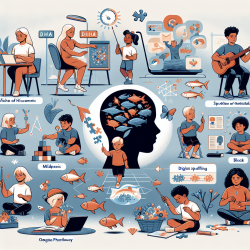Introduction
As a speech-language pathologist (SLP) dedicated to improving outcomes for children, it's crucial to stay informed about the latest research in neurodegenerative diseases and their impact on social cognition. A recent study titled Association Between Social Cognition Changes and Resting State Functional Connectivity in Frontotemporal Dementia, Alzheimer’s Disease, Parkinson’s Disease, and Healthy Controls offers valuable insights that can enhance our practice.
Key Findings from the Study
The study examined 57 participants, including patients with frontotemporal dementia (FTD), Alzheimer’s disease (AD), Parkinson’s disease (PD), and healthy controls (HC). The research focused on the relationship between alterations in resting-state functional connectivity and social cognition dysfunction. Here are the significant findings:
- Altered functional connectivity in brain regions crucial for social cognition was observed in neurodegenerative disease patients compared to healthy controls.
- Specific brain regions such as the left inferior temporal gyrus (L-ITG), right central opercular cortex (R-COp), and right supramarginal gyrus (R-SMG) showed significant differences in activation among the groups.
- Functional connectivity correlated with performance on social cognition tasks, suggesting that these alterations could be responsible for social cognition deficits in neurodegenerative diseases.
Implications for Speech-Language Pathologists
Understanding these findings can help SLPs develop more effective interventions for children, particularly those with social cognition challenges. Here are some practical steps to consider:
1. Integrate Social Cognition Assessments
Incorporate tools like the Awareness of Social Inference Test-Emotion Evaluation Test (TASIT-EET) and the Interpersonal Reactivity Index (IRI) into your assessments. These tools can help identify specific social cognition deficits, allowing for targeted interventions.
2. Focus on Functional Connectivity
Consider the role of functional connectivity in social cognition. Interventions that enhance connectivity in key brain regions, such as the L-ITG and bilateral frontal pole, may improve social cognition outcomes. Techniques like neurofeedback and mindfulness training can be explored.
3. Tailor Interventions to Individual Needs
Recognize that social cognition deficits can vary widely. Personalized interventions that address specific connectivity issues and social cognition challenges will likely be more effective. Use data-driven approaches to monitor progress and adjust strategies as needed.
Encouraging Further Research
While this study provides valuable insights, further research is essential to fully understand the relationship between functional connectivity and social cognition. Practitioners are encouraged to stay updated on the latest findings and consider participating in research initiatives.
Conclusion
The study on social cognition and functional connectivity in neurodegenerative diseases offers crucial insights that can enhance our practice as SLPs. By integrating these findings into our assessments and interventions, we can create better outcomes for children with social cognition challenges.
To read the original research paper, please follow this link: Association Between Social Cognition Changes and Resting State Functional Connectivity in Frontotemporal Dementia, Alzheimer’s Disease, Parkinson’s Disease, and Healthy Controls.










